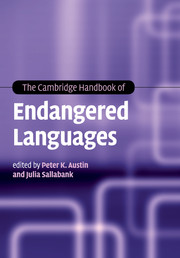Book contents
- The Cambridge Handbook of Endangered Languages
- Series page
- The Cambridge Handbook of Endangered Languages
- Copyright page
- Contents
- Figures
- Tables
- Contributors
- Acknowledgements
- 1 Introduction
- Part 1 Endangered languages
- Part II Language documentation
- Part III Responses
- 14 Language policy for endangered languages
- 15 Revitalization of endangered languages
- 16 Orthography development
- 17 Lexicography in endangered language communities
- 18 Language curriculum design and evaluation for endangered languages
- 19 The role of information technology in supporting minority and endangered languages
- Part IV Challenges
- References
- Index of language names
- Index
18 - Language curriculum design and evaluation for endangered languages
from Part III - Responses
Published online by Cambridge University Press: 05 June 2012
- The Cambridge Handbook of Endangered Languages
- Series page
- The Cambridge Handbook of Endangered Languages
- Copyright page
- Contents
- Figures
- Tables
- Contributors
- Acknowledgements
- 1 Introduction
- Part 1 Endangered languages
- Part II Language documentation
- Part III Responses
- 14 Language policy for endangered languages
- 15 Revitalization of endangered languages
- 16 Orthography development
- 17 Lexicography in endangered language communities
- 18 Language curriculum design and evaluation for endangered languages
- 19 The role of information technology in supporting minority and endangered languages
- Part IV Challenges
- References
- Index of language names
- Index
Summary
Keywords
- Type
- Chapter
- Information
- The Cambridge Handbook of Endangered Languages , pp. 354 - 370Publisher: Cambridge University PressPrint publication year: 2011
- 6
- Cited by

